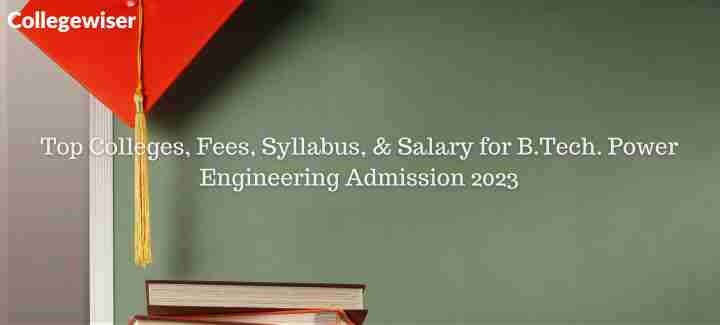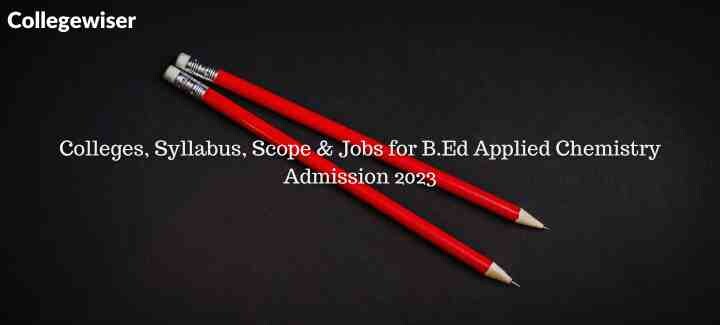Admission for B.Tech. Power Engineering 2023–24: A course leading to the UG Bachelor’s degree is the B.Tech in Power Engineering. Naturally, the period is four years. There are eight semesters in it. Students who have finished their 10+2 with 50% or above in PCM subjects from an accredited board are eligible. Electric power production, delivery, and use are the focus of power engineering. Depending on the university, the course’s overall cost ranges from INR 3 to 6 lakhs. After completing the program, students can expect to earn an annual income between INR 4 and 10 lakhs (LPA). The top university for the B.Tech. Power Engineering curriculum is Uttarakhand Ayur Ved University.
Enquiry Now!
Highlights of B.Tech. Power Engineering Admission
| Course Name | B.Tech Power Engineering |
| Admission Process | Counselling after qualifying for the entrance test |
| Full-Form | Bachelor in Technology in Power Engineering |
| Duration | Course Duration is 4 Years. |
| Average Salary Offered | INR 4 to 10 Lakhs per annum (LPA) |
| Average Fee Incurred | INR 3 to 6 Lakhs |
| Eligibility | 10+2 pass out with a minimum aggregate of 50% marks from a recognized university. |
Admission to B.Tech. Power Engineering 2023–24
A four-year undergraduate Engineering degree program offered globally is called the “Bachelor of Technology in Power Engineering.” The curriculum includes lessons in thermal engineering, electric power engineering, finance, and other fields. The purpose of the curriculum is to learn and develop systems for controlling the production, conversion, transmission, and distribution of energy.
Several institutions are currently accepting applications for the class of 2023’s B.Tech. Power Engineering. Students who desire to learn about turbines, steam boilers, windmills, and other sources of energy can pursue this profession of engineering after completing their 12th grade in PCM with a 75% grade point average, a B.Sc., or a diploma program. Theoretical material, Concepts, and Real-World Experiments in Thermodynamics, Fluid Transfer, and Heat Transfer theory in Machines and Mechanical Design, etc.
The National Power Training Institute (NPTI), IITs, AKTU, and Tata Institute of Technology are the notable universities that offer the programs. They admit students through well-known entrance tests like JEE Mains, JEE Advanced, WBJEE, VITJEE, etc. The entrance tests have been held and all application forms have been submitted. Admissions counselling for the B.Tech. in Power Engineering is now underway.
current updates
The deadline to apply for the UPES University’s B.Tech. Power Engineering Admission program is June 30, 2023.
The deadline is July 1, 2023. (Provisionally) submit an application for B.Tech. Power Engineering Admission 2023 at the National Power Training Institute for the academic year 2023–2024.
At GMRIT University, the application process for B.Tech. Power Engineering is ongoing. The deadline is June 30.
Admission Procedure for B.Tech. Power Engineering in 2023
The majority of the B.Tech. Power Engineering admissions process is conducted online. It starts with an online application and finishes with the students’ college enrollment. Engineering admissions require registration prior to taking the entrance exam.
Despite the fact that a lot of schools and universities offer their offline admission form locally. Following a discussion of the online and offline admissions procedures, students can select one of them based on their preferences.
B.Tech. Power Engineering Admissions Procedures Online
First and foremost, when applying online, a candidate has to have all of the necessary paperwork on hand.
He will then need to locate an official website of the body in charge of the entrance exam.
In this case, he must open the site and select “New Registration.”
If prompted, make a user ID for yourself.
Choose the exam and course names that correspond to the application you are making.
Now enter your personal information, such as your name, parents’ names, address, date of birth, category, nationality, etc.
Please accurately include all of your academic details.
Upload the relevant documents, along with scanned copies of your photo and signature.
Pay the application fee using a credit/debit card, bank account, internet banking, UPI, or another method.
Verify your submission and get the application form that you just submitted.
B.Tech. Power Engineering Admissions by Mail
An applicant must go to the institution to obtain an offline form in order to apply for an offline admission form.
If it says to do so, he can download the application form from the college website.
Upon receiving the form Fill it out and affix the required files,
Place a passport-size photo next to your signature in the appropriate spot on the form.
The application form cost must be submitted in person at the counter.
Gather the receipt and save it for future use.
JEE Mains is the joint entrance test for B.Tech.
Power Engineering. The Mains is the preliminary entrance exam for admission to prestigious Indian Institute of Technologies and State level engineering institutes or private colleges that provide engineering programs. This test is given by the National Testing Agency (NTA).
Joint Entrance Examination, Advanced the Advance test is the second stage of admission to UG and PG engineering programs at IITs. This year’s exam is being administered by IIT Guwahati. The exam has already taken place, and the Jessa mechanism will be used for seat allocation.
The West Bengal Joint Entrance Exam (WB JEE) is a state-level test that the WEBJEE board administers to determine admission to B.Tech and B.Pharma programs.
BITSAT Pilani administers the Birla Institute of Technology and Science Admission Test. There are two sessions for BITSAT. A applicant gets two chances to try; he can apply for session 1 or session 2 or for both possibilities.
For admission to Bachelor of Technology degrees at SRM Institute of Technology, a Deemed to be University, the SRM Joint Engineering Entrance Examination (SRM JEE) is held. The university has campuses in a number of different towns, including Ghaziabad, Rampura, Amravati, Sikkim, and Katan Kuladhar.
Syllabus for B.Tech. Power Engineering Admission
| First Semester | Second Semester |
| Applied Mathematics – I | Applied Mathematics – 2 |
| Applied Physics – I | Applied Physics – 2 |
| Applied Chemistry – I | Applied Chemistry – 2 |
| Manufacturing Process | Introduction to Programming |
| Introduction to Computers and Auto CAD | Engineering Mechanics |
| Communication Skills – I | Communication Skills – 2 |
| Third Semester | Fourth Semester |
| Fluid Mechanics | Fluid Machinery |
| Thermodynamics | Engineering Thermodynamics |
| Mathematics | Materials Science and Technology |
| Mechanics of Deformable Bodies | Theory of Machines |
| Circuit Theory & Network | Electrical Machines |
| Electrical Electronic Measurement | Digital Electronics & Integrated Circuits |
| B. Practical | B. Practical |
| Mechanics of Deformable Bodies Lab | Materials Science Lab |
| Fluid Mechanics Lab. | Electrical Machines Lab |
| Circuit Theory & Network Lab | Digital Electronics & Integrated Circuits Lab |
| Electrical Electronic Measurement Lab | C. Sessional |
| – | Technical Report Writing & / Language Practice Laboratory |
| Fifth Semester | Sixth Semester | ||
| Renewable Energy Systems | Steam Generators and their Auxiliaries | ||
| Hydro Power Generation | Steam Turbines and their Auxiliaries | ||
| Nuclear Power Generation | Electrical Equipment in Power Station. | ||
| Electrical Machines II | Power Transmission and Distribution | ||
| Heat Transfer | Control Systems | ||
| Microprocessor and Microcontrollers | Elective Paper: Refrigeration and Air Conditioning High Voltage Engg. | ||
| B. Practical | B. Practical | ||
| Electrical Machines Lab II | Combustion Lab. | ||
| Microprocessor and Microcontrollers Lab | C. Sessional | ||
| Heat Transfer Lab | Seminar | ||
| Fluid Machinery Lab | Study of Power Plant Schemes (Mech.) | ||
| C. Sessional | Study of Power Plant and T & D Schemes (Elect.) | ||
| Vocational Training | Industrial training for 4 weeks as arranged by the Institute during a vacation at the end of the sixth semester, to be credited in the seventh semester. | ||
| Seventh Semester | Eighth Semester | ||
| Advanced Power Generation Technology | Thermal Power Plant Operation & Maintenance | ||
| Protections & Instrumentations | Operations Research and Industrial Engineering | ||
| Internal Combustion Engines | Elective: Manufacturing Science or Electric Drives | ||
| Power System Operation | Elective: Technology of Machining and metal cutting or HVDC Transmission | ||
| Elective Paper: Design of Mech. Equipment Design of Elect. Equipment | B. Sessional | ||
| Elective Paper: Power Electronics Tribology & CBM | Project II (Elect. / Mech.) | ||
| B. Practical | Grand Viva-Voce | ||
| Protection Lab | Seminar on Power Engineering | ||
| Control & Instrumentation Lab. | – | ||
| Heat Power Lab | – | ||
| C. Sessional | – | ||
| Project I (Mech. / Elect.) | – | ||
| Practical Training | – | ||
Top Colleges for B.Tech. Power Engineering
Electrical and electronics engineering are the two primary subfields in B.Tech power engineering. In accordance with the NIRF (National Institutional Ranking Framework) 2023
Name the universities that provide a B.Tech. in power engineering.
Institution for National Power Training
University of Guru Gobind Singh Indraprastha
Beautiful Professional University
Technology Institute Birla
Technology Institute NIMS GMR
Madras IIT
Delhi IIT
Bombay IIT
Kanpur IIT
Salary for B.Tech. Power Engineering
Graduates of B-Tech Power Engineering can expect to make an average starting salary of between INR 4 and 10 lakhs per annum (LPA).
Different Courses
All Day
It is a four-year full-time program that frequently offers early classes.
Part-Time/Online
There are no online or distant learning options available for this program.
Recommended Indian University for B.Tech. Power Engineering Admission
| University Name | State/City | Type of University |
| Jadavpur University | Kolkata | State University |
| KIIT School of Engineering | Bhubaneswar | private deemed university |
| Sastra | Thanjavur | Deemed University |
| Guru Gobind Singh Indraprastha University | Delhi | Government University |
| Tolani Maritime Institute | Pune | Private institution |
| Jain University | Bangalore | private deemed university |
Power Engineering for B.Tech: Purpose
The B.Tech. Power Engineering curriculum covers topics like Power System Simulation, Power Electronics, Information Technology, Ecological/ Energy Production, Renewable Energy Theory, Entrepreneurship, Management, and Finance, among others.
In its eight syllabi, the B.Tech. Power Engineering program covers topics such as Solar Engineering, the Energy Market, Energy Management, Electronic (Power, System & Machines), Electronic, Computer Science and Materials, etc. At the master’s and doctoral levels, these articles might be intensely specialized.
After completing their B.Tech in the relevant area, students can register for the M.Tech in Power Engineering. Passing the GATE entrance exam is a requirement for candidates. You can apply to study in India.
Electrical, Electronics, Solar Energy, Computer Science, and Thermodynamics M.Tech specialities are all achievable following graduation. Power engineering B.Tech. The VITMEE, AG PGCET, Gujarat PG CET, TS PGCET, and other alternative entry exams to Gate are listed here. Additionally, several private colleges admit students without an entrance exam.
MBA in Marketing, Management, and Finance: During his B.Tech. in Power Engineering, the graduate previously studied Marketing, Management, and Engineer Economics/Finance. He can now pursue an MBA in the specialities.
Third Degree Ph.D. in Power Engineering: After earning a B.Tech. in a specialized field, graduates are prepared to pursue a third-degree Ph.D. in power engineering abroad. This programme is offered by the Warsaw University of Technology in Poland.
B.Tech. Power Engineering: Compensation
Those with a B.Tech degree can find employment as engineers, managers, market policy makers, researchers, etc. He has a salary range of 3 to 5 LPA. The wage may differ depending on experience, education, the type of job, the company or organization, and the public or government sectors. For a B.Tech engineer, the highest income is listed as $30 lakh per year.
An engineering graduate is hired by recruiting firms. NTPC, BALCO, L&T Construction, Bhili Steel Plant, SAIL, BHEL, GAIL, TATA Motors, Power Grid Corporation of India, and more well-known, respected firms are among those with open positions.
Job Options for B.Tech. Power Engineering
Engineers who have studied computer science, aerospace, and the three different ways to generate, transmit, distribute, and use electricity are more likely to find employment in these sectors.
Apart from these, the degree bearer has access to careers in manufacturing, telecommunications, industrial equipment maintenance, power system maintenance, and entrepreneurship.
For the following positions, a graduate may be hired.
Power engineer
technician
service technician
maintenance engineer
Mechanical Engineers
Lecturer




